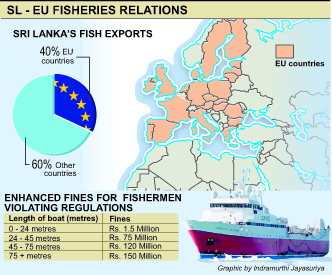News
Bill to deter ‘unregulated’ fishing and lift EU fishing ban
When the Fisheries and Aquatic Resources (Amendment) Act was taken up in Parliament for debate on Tuesday, both Government and Opposition legislators welcomed the new laws to impose heavy fines on those violating international fishing regulations.
The EU-IUU (Illegal, Unreported and Unregulated) fishing ban which was announced on Oct.14 last year, came into force three months later on Jan.14 this year. Following are views expressed at the debate:-
Mangala Samaraweera – Minister of Foreign Affairs:
When engaged in deep-sea fishing, countries have obligations to comply with international Regulations that ensure the sustainability of common resources. In Sri Lanka’s case, the relevant regulations are those agreed upon at the Indian Ocean Tuna Commission (IOTC). The EU imposes bans on countries that fail to comply with these regulations.
These bans are imposed after multiple warnings, and offers of assistance to help with compliance and investigations. It is the previous administration’s failure to comply with these regulations, despite repeated warnings, and their turning a blind eye to IUU fishing activities that led to the current ban.
There are many areas where Sri Lanka needed and still needs drastic improvement, especially in the application of legislative frameworks and in the ground policing of vessels. It has become evident that Sri Lanka needs to implement several serious reforms before the EU begins to consider lifting the ban.
There was a reversal of such a fishing ban in Belize, where, I was told that it took eight months. Senior officials I met in Brussels, assured me they will give priority to Sri Lanka, but Sri Lanka must have the political will to implement these reforms as early possible.
I think, this Bill again amply demonstrates the political will of the new administration to get this ban reversed as early as possible.
UPFA MP Felix Perera:
As an island, we have vast marine resources. There are thousands dependent on the fisheries industry for their livelihood. Our Government never allowed other vessels to fly the Sri Lanka flag at any time. However, foreign vessels introduced into our waters and their modes of fishing have led to the depletion of much of our fisheries resources. It is vital to stop foreign vessels fishing in our waters. But these new fines the government is imposing on vessels is too high.
DNA MP Anura Dissanayake:
There are nearly 600,000 people directly involved in the fisheries sector. Their families too are dependent on this sector. Hence, about 2.6 million people are dependent on the fisheries sector. The EU ban directly affects these fishing families. The EU, since 2010, warned of the impending ban, but the then government failed to take necessary measures to avoid the ban. The EU asked the then government to comply with several conditions, but these were ignored. It is the hapless fishermen who have had to pay the price for the previous government’s mistakes.

